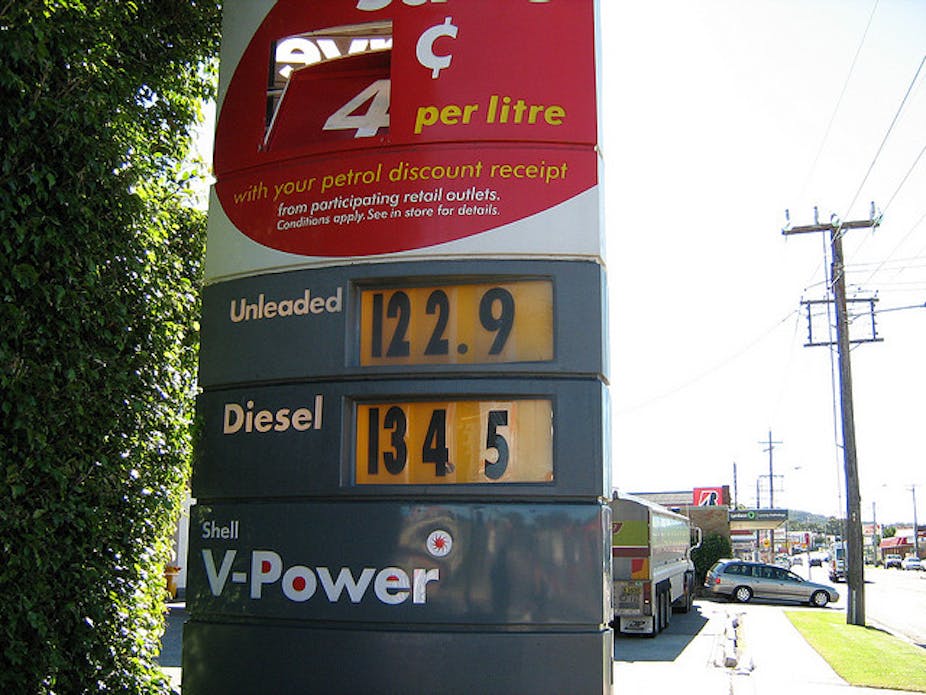A curious feature of the election campaign to date has been the lack of focus on competition and consumer policy. Generally this subject rates highly, as parties try to curry favour with consumers and small business alike.
While there is talk of a major review of competition law if the Coalition wins, the issue has mostly been a sleeper. This might be because a key topic right now has proven very dicey – what to do about fuel discounts?
The Australian Retailers Association this week called for intervention, arguing that steep discounts are ruinous for competition. In late July, Rod Sims – chairman of the Australian Competition and Consumer Commission – also expressed his concerns. Indeed, the ACCC’s unease dates back to at least 2009.
And in NSW, the Barry O'Farrell-led government has recently banned petrol stations from only displaying discounted fuel prices available to drivers using grocery shopper dockets, threatening fines of $110,000.
Shopper dockets and competition law
But what is the basis for such concerns, and how might they play out in terms of competition law?
It’s a difficult issue both as a matter of law and public policy. Competition law is expressly designed to advance the interests of consumers, not individual competitors. This can mean that small business becomes collateral damage when big business moves into a new space or starts competing in a different manner.
The view that fuel discounts are anti-competitive is generally premised on claims of cross-subsidisation: Coles and Woolworths – the parties behind the huge “shopper docket” discounts – are said to be making such large profits on their grocery sales that they can take a hit on fuel. Competition is therefore (allegedly) reduced in both groceries and fuel, as smaller players are squeezed out of both markets.
Legally, such an argument is extremely difficult to prove, particularly given that the ACCC itself, in its 2008 Grocery Report, says that the grocery chains don’t make excessive profits.
Legal immunity
There are additional complexities: some, but not all, of this conduct is currently protected from legal action. A process known as “notification” allows parties to obtain legal immunity for certain arrangements – if you tell the ACCC of your planned conduct and the ACCC elects not to intervene, notification protects that conduct from claims that it is anti-competitive.
About ten years ago, when faced with a large number of “shopper docket” notifications, the ACCC published a paper explaining why – at that time – it did not consider that fuel discounts were anti-competitive.
So, if the ACCC wants to intervene now, a starting point would be to begin the legal process of revoking these notifications. Of itself, this wouldn’t necessarily make the discounts illegal but it would allow them to be examined.
Nonetheless, it might be argued that the sheer magnitude of the discounts means they fall outside the scope of existing notifications and are therefore not protected. But, if the ACCC wanted to prosecute Coles and/or Woolworths for anti-competitive conduct on this basis, it would face the very difficult task of arguing around the notifications.
In other words, it would need to argue that X discount (which is notified) does not substantially lessen competition, but Y discount (which is not notified) does. Any prosecution would also need to isolate the competition effects of discounting by a particular player – say, Coles – from discounting by others in the market.
Proving a substantial lessening of competition or a misuse of market power is notoriously difficult under any circumstances. For the ACCC to argue around existing notifications makes a difficult case almost impossible.
Maybe the discounts are a sign of efficiency?
There is also the issue that perhaps the discounts reflect better, more efficient cost structures. It could be that the sheer size of Coles and Woolworths creates a more efficient supply chain, enabling them to charge cheaper prices. There is evidence from the United Kingdom to suggest exactly this.
On this basis, smaller retailers are not being forced out by unfair competition; rather, they cannot match the efficiency of the biggest and best.
Inadequate information
In Australia, there is simply not enough information on the public record to decide whether we are seeing cross-subsidisation or efficiency at work. This requires a detailed understanding of price and cost in both groceries and fuel.
Even with the ACCC’s impressive investigative powers, it would not be straightforward to form a conclusion. One must take into account shared overheads, multiple product lines (for groceries), rapid price changes (for fuel), exchange rate variations and a raft of internal rebates. It’s a labyrinthine exercise and one would struggle to prove anything in court.
Assuming the discounts can be proven to be “unfairly” funded (a big assumption), any intervention would still need to be carefully considered. Consumers are benefitting right now. One would need to be very sure that market structures, and therefore consumers, will suffer irrevocable long-term harm before acting to prevent such large savings.
You can see the difficult position of the political parties – they are all for standing-up for small business. But do they really want to be telling Australian mums and dads that they should pay more for their petrol?

